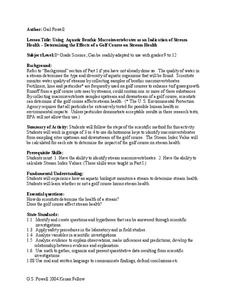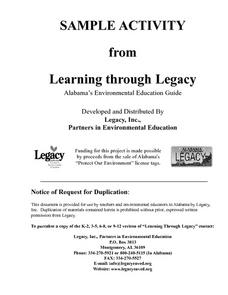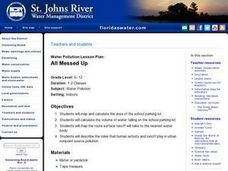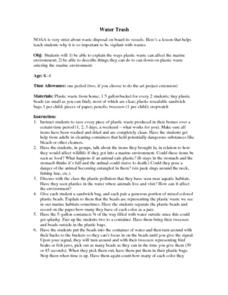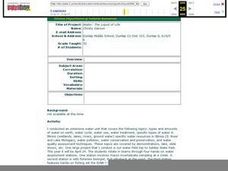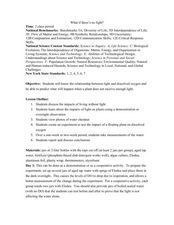Purdue University
Healthy Water, Happy Home
Clear water does not mean clean water. A collaborative lesson has groups play a board game to identify sources of water pollution and develop strategies for improving water quality. Their investigations include reference to the water...
NOAA
Stressed Out!
Are our oceans really suffering due to the choices humans make? The sixth and final installment in the volume of activities challenges research groups to tackle one of six major topics that impact ocean health. After getting to the...
Curated OER
TE Activity: Stream Consciousness
Fourth graders study how environmental engineers monitor water quality. They use environmental indicators to determine the quality of stream water in their area. They count the number of macroinverabrates and use the information they...
Teach Engineering
The Great Pacific Garbage Patch
The Great Pacific Garbage Patch is one of several garbage patches around the world where garbage accumulates naturally. As part of a GIS unit that combines oceanography, environmental science, and life science, class members investigate...
Kenan Fellows
Determining the Effects of a Golf Course on Stream Health
Do golf courses affect the water organisms in nearby streams and ponds? Small groups collect samples of water upstream and downstream from a golf course and analyze the macroinvertebrates found and the stream index values of the two...
NOAA
Build Your Own Ocean Ecosystem
Hold the sea in the palm of your hand! Amateur oceanographers work together to create models of an ocean ecosystem in the sixth and final installment in a series. Raise awareness of global ocean health issues through guided research,...
Curated OER
Posters and People
Students create and design posters reflecting the types of litter harmful to aquatic wildlife. They explain the dangers of fishing line to aquatic wildlife, plastic bags to dolphins, and fish nets to fish. They design a poster to...
Curated OER
Pond Water Web
Students familiarize themselves with the common organisms that live in a pond and discover their importance in a balanced aquatic habitat as they create food webs. They also investigate how an environmental change affects the habitat as...
Kenan Fellows
Determining Stream Health by the Diversity and Types of Benthic Organisms
How diverse are the benthic organisms found in local streams? Using the information learned in previous lessons on identification of macroinvertebrates and on calculating stream index values, groups determine the health of local streams....
Curated OER
Pond Water Web
Students identify the different organisms in the food web. In this biology activity, students create food chains using the information on cards. They explain what happens if an organism is removed or added in the web.
Curated OER
The Affect of Water Temperature on Living Organisms
Young scholars examine the environmental impact of global warming. For this environmental science lesson, students design and conduct an experiment about the effect of temperature on paramecia. They write a lab report about their...
Curated OER
All Messed Up
Pupils begin the experiment by mapping and calculating their school parking lot. They calculate the volume of water falling on the lot and map the route the water runoff takes. They discuss the roles that humans play in affecting water...
Curated OER
Water Trash
Students explain the ways plastic waste can affect the marine environment. They are able to describe things they can do to can down on plastic waste entering the marine environment.
Curated OER
Introduction to Dissolved Oxygen and Demonstration of a Simple Test Procedure
Students explain the importance of dissolved oxygen in water ecosystems. They describe the aquatic oxygen cycle and the effect of water pollution on oxygen. They make observations, collect data and draw a conclusion.
Curated OER
Water Quality Survey
Students identify the differences in the water quality of a stream and complete water testing. In this water quality lesson students collect aquatic insects and identify them.
Curated OER
Hypoxia and the Dead Zone in the Gulf of Mexico
Students investigate the causes of hypoxia, the characteristics of a watershed, and how the actions and management practices of people can both negatively and positively affect aquatic ecosystems.
Curated OER
Water: The Liquid of Life
Sixth graders complete a activity on the properties, types and amounts of water on Earth. In groups, they travel between stations to identify water resources in Illinois and pollution sources. They complete the activity with a field...
Curated OER
Teaching about Conductivity
High schoolers explore conductivity and productivity in aquatic systems.
Curated OER
Water Quality Monitoring
Students comprehend the four parameters of water quality. They perform tests for salinity, dissolved oxygen, pH and clarity or turbidity. Students comprehend why scientists and environmental managers monitor water uality and aquatic...
Curated OER
Amphipods
Young scholars identify organisms that live at the bottom of the body of water. In this biology lesson, students evaluate the effects of pollution to amphipods population. They examine collected data and create a bar graph comparing them.
Curated OER
Ecology
Pupils examine the relationship between the environment and those that have to live in it. They discover that we are responsible for our environment and understand the consequences of its neglect.
Curated OER
What If There's No Light?
students discuss the importance of light and the consequences of living without it. Using a plant as a demonstration, students predict and observe what happens to a plant when it does not receive enough light. In groups, they experiment...
Curated OER
Easy Street
Students work together to complete a simulation on drought days. As a class, they discuss their results and compare water usage of the past to current numbers. After reading short excerpts, they answer discussion questions and review as...
Curated OER
The Chesapeake Bay in Captain John Smith's Time
When Captain John Smith visited the Chesapeake Bay in the summer of 1608, what types of animals and habitats did he encounter? Your young historians will analyze primary source documents to answer this question, as well as compare the...






